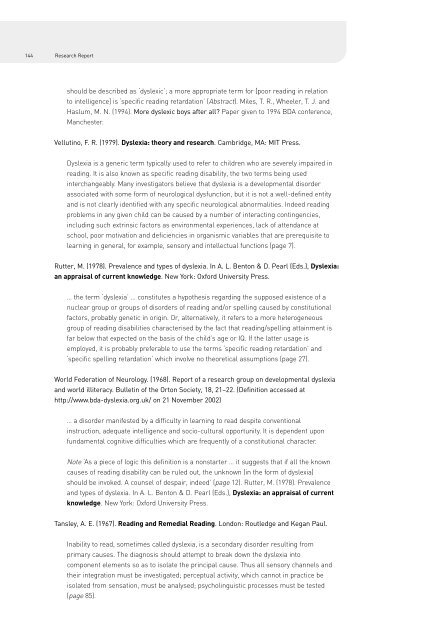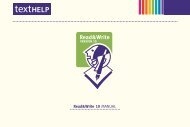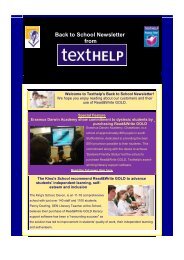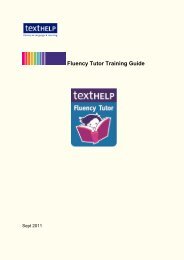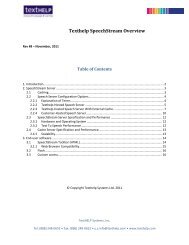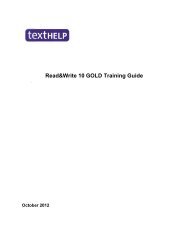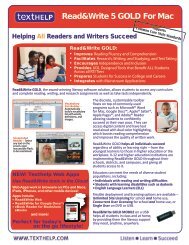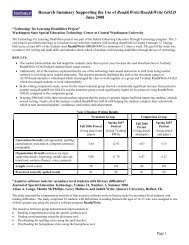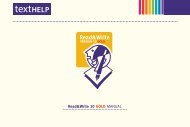01 NRDC Dyslexia 1-88 update - Texthelp
01 NRDC Dyslexia 1-88 update - Texthelp
01 NRDC Dyslexia 1-88 update - Texthelp
Create successful ePaper yourself
Turn your PDF publications into a flip-book with our unique Google optimized e-Paper software.
144<br />
Research Report<br />
should be described as ‘dyslexic’; a more appropriate term for [poor reading in relation<br />
to intelligence] is ‘specific reading retardation’ (Abstract). Miles, T. R., Wheeler, T. J. and<br />
Haslum, M. N. (1994). More dyslexic boys after all? Paper given to 1994 BDA conference,<br />
Manchester.<br />
Vellutino, F. R. (1979). <strong>Dyslexia</strong>: theory and research. Cambridge, MA: MIT Press.<br />
<strong>Dyslexia</strong> is a generic term typically used to refer to children who are severely impaired in<br />
reading. It is also known as specific reading disability, the two terms being used<br />
interchangeably. Many investigators believe that dyslexia is a developmental disorder<br />
associated with some form of neurological dysfunction, but it is not a well-defined entity<br />
and is not clearly identified with any specific neurological abnormalities. Indeed reading<br />
problems in any given child can be caused by a number of interacting contingencies,<br />
including such extrinsic factors as environmental experiences, lack of attendance at<br />
school, poor motivation and deficiencies in organismic variables that are prerequisite to<br />
learning in general, for example, sensory and intellectual functions (page 7).<br />
Rutter, M. (1978). Prevalence and types of dyslexia. In A. L. Benton & D. Pearl (Eds.), <strong>Dyslexia</strong>:<br />
an appraisal of current knowledge. New York: Oxford University Press.<br />
… the term ‘dyslexia’ … constitutes a hypothesis regarding the supposed existence of a<br />
nuclear group or groups of disorders of reading and/or spelling caused by constitutional<br />
factors, probably genetic in origin. Or, alternatively, it refers to a more heterogeneous<br />
group of reading disabilities characterised by the fact that reading/spelling attainment is<br />
far below that expected on the basis of the child’s age or IQ. If the latter usage is<br />
employed, it is probably preferable to use the terms ‘specific reading retardation’ and<br />
‘specific spelling retardation’ which involve no theoretical assumptions (page 27).<br />
World Federation of Neurology. (1968). Report of a research group on developmental dyslexia<br />
and world illiteracy. Bulletin of the Orton Society, 18, 21–22. (Definition accessed at<br />
http://www.bda-dyslexia.org.uk/ on 21 November 2002)<br />
… a disorder manifested by a difficulty in learning to read despite conventional<br />
instruction, adequate intelligence and socio-cultural opportunity. It is dependent upon<br />
fundamental cognitive difficulties which are frequently of a constitutional character.<br />
Note ‘As a piece of logic this definition is a nonstarter … it suggests that if all the known<br />
causes of reading disability can be ruled out, the unknown (in the form of dyslexia)<br />
should be invoked. A counsel of despair, indeed’ (page 12). Rutter, M. (1978). Prevalence<br />
and types of dyslexia. In A. L. Benton & D. Pearl (Eds.), <strong>Dyslexia</strong>: an appraisal of current<br />
knowledge. New York: Oxford University Press.<br />
Tansley, A. E. (1967). Reading and Remedial Reading. London: Routledge and Kegan Paul.<br />
Inability to read, sometimes called dyslexia, is a secondary disorder resulting from<br />
primary causes. The diagnosis should attempt to break down the dyslexia into<br />
component elements so as to isolate the principal cause. Thus all sensory channels and<br />
their integration must be investigated; perceptual activity, which cannot in practice be<br />
isolated from sensation, must be analysed; psycholinguistic processes must be tested<br />
(page 85).


